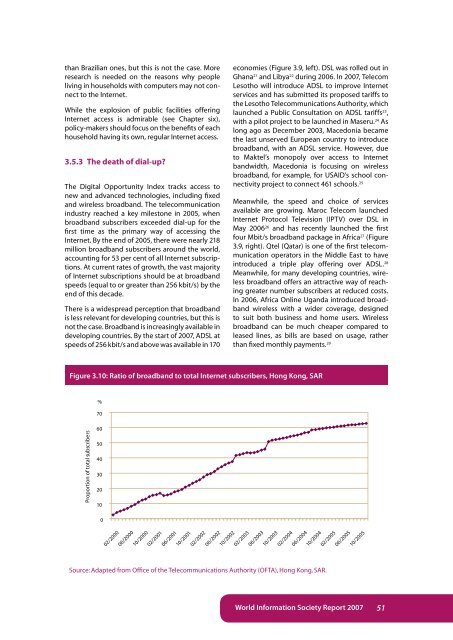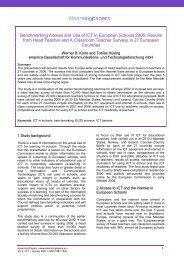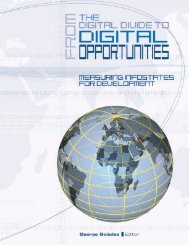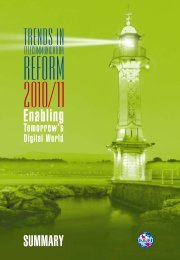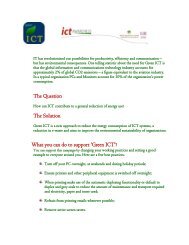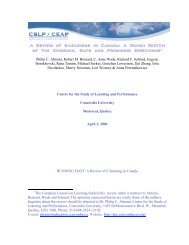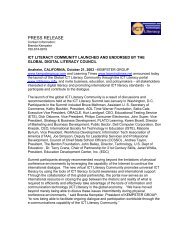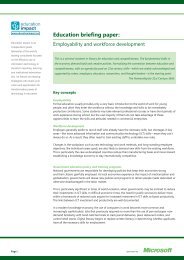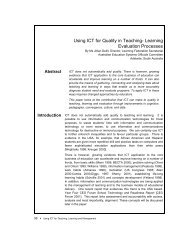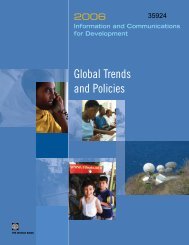The Digital Opportunity Index (DOI) - ITU
The Digital Opportunity Index (DOI) - ITU
The Digital Opportunity Index (DOI) - ITU
Create successful ePaper yourself
Turn your PDF publications into a flip-book with our unique Google optimized e-Paper software.
than Brazilian ones, but this is not the case. More<br />
research is needed on the reasons why people<br />
living in households with computers may not connect<br />
to the Internet.<br />
While the explosion of public facilities offering<br />
Internet access is admirable (see Chapter six),<br />
policy-makers should focus on the benefits of each<br />
household having its own, regular Internet access.<br />
3.5.3 <strong>The</strong> death of dial-up?<br />
<strong>The</strong> <strong>Digital</strong> <strong>Opportunity</strong> <strong>Index</strong> tracks access to<br />
new and advanced technologies, including fixed<br />
and wireless broadband. <strong>The</strong> telecommunication<br />
industry reached a key milestone in 2005, when<br />
broadband subscribers exceeded dial-up for the<br />
first time as the primary way of accessing the<br />
Internet. By the end of 2005, there were nearly 218<br />
million broadband subscribers around the world,<br />
accounting for 53 per cent of all Internet subscriptions.<br />
At current rates of growth, the vast majority<br />
of Internet subscriptions should be at broadband<br />
speeds (equal to or greater than 256 kbit/s) by the<br />
end of this decade.<br />
<strong>The</strong>re is a widespread perception that broadband<br />
is less relevant for developing countries, but this is<br />
not the case. Broadband is increasingly available in<br />
developing countries. By the start of 2007, ADSL at<br />
speeds of 256 kbit/s and above was available in 170<br />
economies (Figure 3.9, left). DSL was rolled out in<br />
Ghana 21 and Libya 22 during 2006. In 2007, Telecom<br />
Lesotho will introduce ADSL to improve Internet<br />
services and has submitted its proposed tariffs to<br />
the Lesotho Telecommunications Authority, which<br />
launched a Public Consultation on ADSL tariffs 23 ,<br />
with a pilot project to be launched in Maseru. 24 As<br />
long ago as December 2003, Macedonia became<br />
the last unserved European country to introduce<br />
broadband, with an ADSL service. However, due<br />
to Maktel’s monopoly over access to Internet<br />
bandwidth, Macedonia is focusing on wireless<br />
broadband, for example, for USAID’s school connectivity<br />
project to connect 461 schools. 25<br />
Meanwhile, the speed and choice of services<br />
available are growing. Maroc Telecom launched<br />
Internet Protocol Television (IPTV) over DSL in<br />
May 2006 26 and has recently launched the first<br />
four Mbit/s broadband package in Africa 27 (Figure<br />
3.9, right). Qtel (Qatar) is one of the first telecommunication<br />
operators in the Middle East to have<br />
introduced a triple play offering over ADSL. 28<br />
Meanwhile, for many developing countries, wireless<br />
broadband offers an attractive way of reaching<br />
greater number subscribers at reduced costs.<br />
In 2006, Africa Online Uganda introduced broadband<br />
wireless with a wider coverage, designed<br />
to suit both business and home users. Wireless<br />
broadband can be much cheaper compared to<br />
leased lines, as bills are based on usage, rather<br />
than fixed monthly payments. 29<br />
Figure 3.10: Ratio of broadband to total Internet subscribers, Hong Kong, SAR<br />
%<br />
70<br />
Proportion of total subscribers<br />
60<br />
50<br />
40<br />
30<br />
20<br />
10<br />
0<br />
02/2000<br />
06/2000<br />
10/2000<br />
02/2001<br />
06/2001<br />
10/2001<br />
02/2002<br />
06/2002<br />
10/2002<br />
02/2003<br />
06/2003<br />
10/2003<br />
02/2004<br />
06/2004<br />
10/2004<br />
02/2005<br />
06/2005<br />
10/2005<br />
Source: Adapted from Office of the Telecommunications Authority (OFTA), Hong Kong, SAR.<br />
World Information Society Report 2007<br />
51


